detail profile michiyo aratama
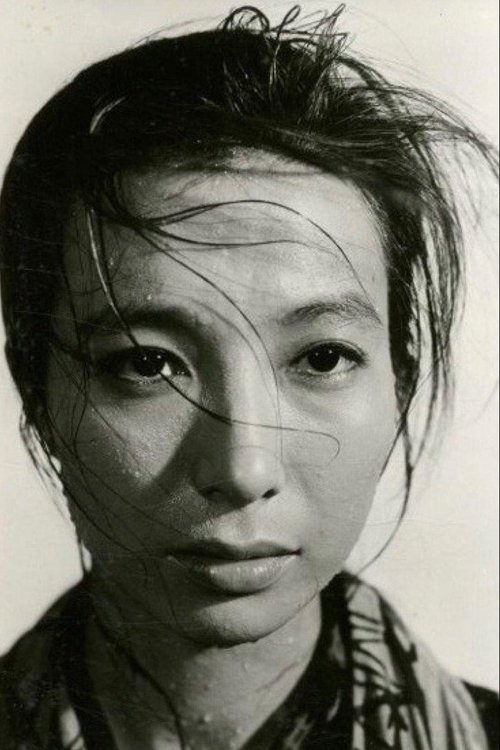
Michiyo Aratama
Митиё Аратама
atau dikenal sebagai
Riwayat Hidup
From Wikipedia, the free encyclopedia.
Michiyo Aratama (新珠 三千代, Aratama Michiyo, 15 January 1930 – 17 March 2001) was a Japanese actress who appeared in leading and supporting roles in such films as Hiroshi Inagaki's Chushingura, Kihachi Okamoto's Samurai Assassin and Sword of Doom, and Masaki Kobayashi's Kwaidan, Hymn to a Tired Man and The Human Condition trilogy.
Description above from the Wikipedia article Michiyo Aratama, licensed under CC-BY-SA, full list of contributors on Wikipedia.
Info Pribadi
Peran Yang Di Mainkan Michiyo Aratama
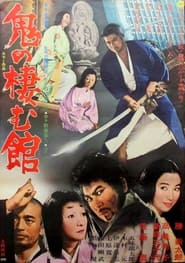 An abandoned temple in the mountains...
An abandoned temple in the mountains...Devil's Temple 1969
An abandoned temple in the mountains outside of the old capital city of Kyoto is the scene of a fated meeting between a traveling priest, two women, and a vicious killer. Bloody violence erupts whenever strangers approach the temple. Can the traveling priest bring his belief in the Buddha and rid the three temple residents of the devils that hold their souls?
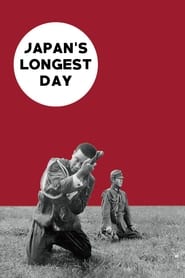 Following the detonation of the atomic...
Following the detonation of the atomic...Japan's Longest Day 1967
Following the detonation of the atomic bombs on Hiroshima and Nagasaki, the Japanese military and the government clash over the demand from the Allies for unconditional surrender. Minister of the Army Anami leads the military officers who propose to fight on, even to the death of every Japanese citizen. Emperor Hirohito, however, joins with his ministers in asking the unthinkable, the peaceful surrender of Japan. When the military plots a coup to overthrow the Emperor's civilian government, Anami must face the choice between his desires and loyalty to his Emperor.
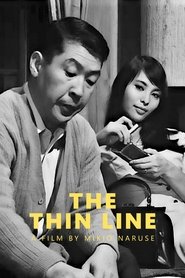 Tashiro coincidentally meets his best friend...
Tashiro coincidentally meets his best friend...The Thin Line 1966
Tashiro coincidentally meets his best friend Sugimoto in a bar very close to the apartment in which Sugimoto’s wayward wife is found dead. Although Tashiro is not a suspect in the police investigation, he is racked with guilt and confesses to his wife, Masako. In an effort to further relieve his tortured sense of guilt, he then confesses to Sugimoto. Neither his wife nor his friend can believe that he could have been involved.
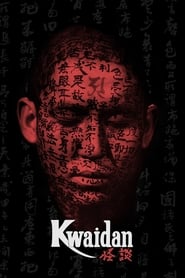 Taking its title from an archaic...
Taking its title from an archaic...Kwaidan 1965
Taking its title from an archaic Japanese word meaning "ghost story," this anthology adapts four folk tales. A penniless samurai marries for money with tragic results. A man stranded in a blizzard is saved by Yuki the Snow Maiden, but his rescue comes at a cost. Blind musician Hoichi is forced to perform for an audience of ghosts. An author relates the story of a samurai who sees another warrior's reflection in his teacup.
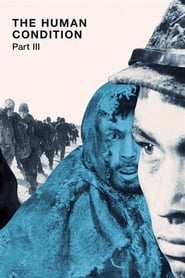 After the Japanese defeat to the...
After the Japanese defeat to the...The Human Condition III: A Soldier's Prayer 1961
After the Japanese defeat to the Russians, Kaji leads the last remaining men through Manchuria. Intent on returning to his dear wife and his old life, Kaji faces great odds in a variety of different harrowing circumstances as he and his fellow men sneak behind enemy lines.
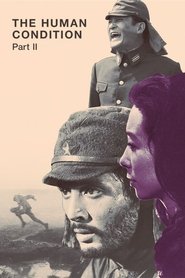 Kaji is sent to the Japanese...
Kaji is sent to the Japanese...The Human Condition II: Road to Eternity 1959
Kaji is sent to the Japanese army labeled Red and is mistreated by the vets. Along his assignment, Kaji witnesses cruelties in the army and revolts against the abusive treatment against the recruit Obara. He also sees his friend Shinjô Ittôhei defecting to the Russian border, and he ends in the front to fight a lost battle against the Russian tanks division.
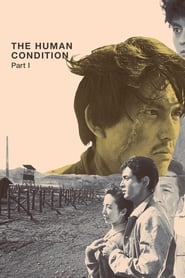 After handing in a report on...
After handing in a report on...The Human Condition I: No Greater Love 1959
After handing in a report on the treatment of Chinese colonial labor, Kaji is offered the post of labor chief at a large mining operation in Manchuria, which also grants him exemption from military service. He accepts, and moves to Manchuria with his newly-wed wife Michiko, but when he tries to put his ideas of more humane treatment into practice, he finds himself at odds with scheming officials, cruel foremen, and the military police.
 A war widow with a young...
A war widow with a young...Summer Clouds 1958
A war widow with a young boy manages a farm with her bossy mother-in-law. When a reporter comes to interview her, the two begin an affair. He turns out to be married and won't leave his wife. Her older brother tries to marry off his children and hang on to/ extend his farm through an advantageous marriage in the face of threatened land confiscation and the desire of his children to get comfortable urban jobs instead of the backbreaking work in the paddy fields under parental control.
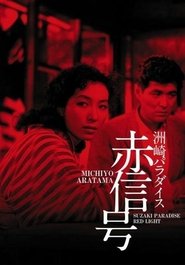 A jobless young couple Yoshigi and...
A jobless young couple Yoshigi and...Suzaki Paradise: Red Light District 1956
A jobless young couple, Yoshigi and Tsutue, wind up at the outskirts of the Suzaki red-light district in Tokyo. Tsutue talks her way into a job pouring sake for male customers at a small bar run by a sympathetic older woman, while Yoshigi is shunted off into a nearby noodle shop, where he gets a job delivering noodles. Tsutue charms and runs off with one of her clients. Yoshigi, ignoring the attentions of a sweet co-worker, pursues Tsutue.
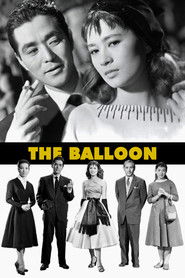 Haruki Murakami is a successful family...
Haruki Murakami is a successful family...The Balloon 1956
Haruki Murakami is a successful family man and the head of a camera company. Unbeknownst to Murakami, his arrogant son oscillates between a mistress and a new lover who sings at a nightclub. When Murakami’s daughter befriends the mistress, the affair throws the family into turmoil.
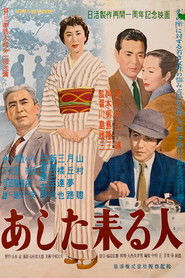 Jiro Sone sacrifices all comfort to...
Jiro Sone sacrifices all comfort to...Till We Meet Again 1955
Jiro Sone sacrifices all comfort to devote himself to research. Young housewife Yachiyo is disappointed with her husband Kappei, who is more attracted to mountain climbing and another girl. When Yachiyo’s father is introduced to Jiro, all of their lives become intertwined...
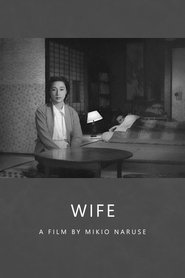 Ten years into a marriage the...
Ten years into a marriage the...Wife 1953
Ten years into a marriage, the wife is disappointed by the husband's lack of financial success, meaning she has to work and can't treat herself and the husband finds the wife slovenly and mean-spirited: she neither cooks not cleans particularly well and is generally disagreeable. In turn, he alternately ignores her and treats her as a servant. Neither is particularly happy, not helped by their unsatisfactory lodgers. The husband is easily seduced by an ex-colleague, a widow with a small child who needs some security, and considers leaving his wife.
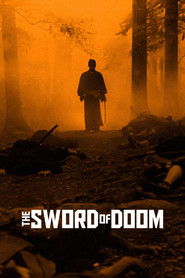 Ryunosuke a gifted swordsman plying his...
Ryunosuke a gifted swordsman plying his...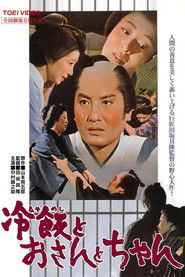 Three stories revolve around independence a...
Three stories revolve around independence a...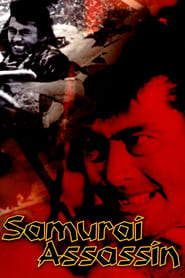 Japan 1860 The men of the Mito...
Japan 1860 The men of the Mito... After their lord is tricked into...
After their lord is tricked into... The family of an older man...
The family of an older man...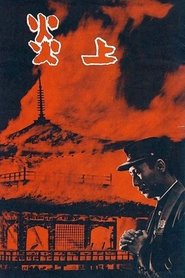 Learning of his familys collapse acolyte...
Learning of his familys collapse acolyte...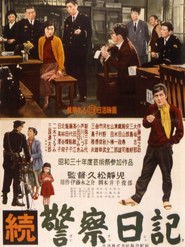 From runaway brides to a typhoon...
From runaway brides to a typhoon... In the dying months of the...
In the dying months of the...